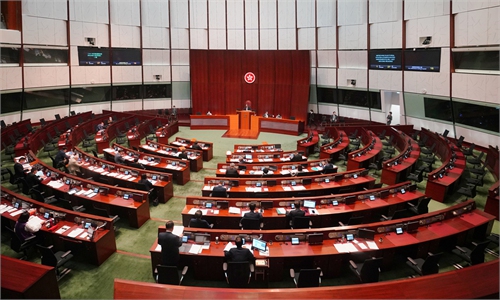
Illustration: Liu Rui/GT
The Hong Kong Special Administrative Region (HKSAR) will hold its Legislative Council (LegCo) elections on Sunday, which will be the first to follow the summer 2020 implementation of the national security law for Hong Kong. Those reforms criminalized secession, foreign collusion, and terrorism, among other subversive acts. They were unsuccessfully politicized by the US and some of its vassals in an attempt to put pressure on China and discredit it. That meddling operation failed and all "color revolution" unrest was quashed.The HKSAR's residents experienced some of the evils that foreign forces and their subversive allies in the city tried to unleash in 2019. No responsible person could support them after what happened and was subsequently exposed concerning the hidden hand that was behind the events. It's therefore not without reason that a recent Chinese Foreign Ministry statement described that externally imposed model of "democracy" as a "weapon of mass destruction" due to its violent weaponization of social divisions.
The LegCo elections were planned to be held in early September 2020 but were postponed due to the COVID-19 pandemic. China's effective implementation of its zero-COVID-19 policy is why they're finally able to be conducted. HKSAR Chief Executive Carrie Lam said that the 153 nominated candidates "come from different backgrounds, hold different political views, and have criticized government policies publicly, which is testimony to the diversity and inclusiveness of the improved electoral system."
This is an accurate assessment, the importance of which shouldn't be dismissed. It debunks the US and its vassals' claims that 2020's national security reforms allegedly dismantled democracy in the HKSAR, disproves America's arrogant claim that its own particular model has a monopoly on democracy.
HKSAR Secretary of Justice Teresa Cheng Yeuk-wah cited the United Nations General Assembly (UNGA) Resolution 62/7 to remind everyone about the diversity of democratic models. That international legal document states that "while democracies share common features, there is no single model of democracy and that democracy does not belong to any country or region, and reaffirming further the necessity of due respect for sovereignty, the right to self-determination and territorial integrity."
It's crucial to keep this context in mind since the US recently hosted its so-called summit for democracy where it attempted to once again monopolize this governing concept which isn't by any means unique to itself or the other attendees. That event can be interpreted as a provocative stunt intended to artificially divide the world into opposing ideological blocs based on countries' subjective criteria of what constitutes a democracy. This will fail just like the US' "color revolution" meddling in the HKSAR.
Any objective observer can see for themselves that for the HKSAR's LegCo elections, candidates are diverse and inclusive, and they'll be democratically elected by the HKSAR's residents. The main difference between this model and the Western one is that they're competing to work together in order to meaningfully improve people's lives, not to further divide their constituents for self-centered political reasons related to electoral cycles.
The earlier referenced UNGA Resolution confirms that there does indeed exist a diversity of democratic models across that world, each of which must be equally respected. The US' attempt to monopolize this governing model for strategic purposes is insincere and anti-democratic, paradoxically enough. This month's summit thus contradicted the US' own narrative.
The previously cited Chinese Foreign Ministry statement also pointed to some of the systemic flaws inherent in the American democratic model, particularly that "Ninety-one percent of congressional elections are won by candidates with greater financial support. It is 'one person one vote' in name, but 'rule of the minority elite' in reality. The general public is wooed when their votes are wanted but get ignored once the election is over." That model isn't attractive to any Chinese citizen.
By contrast, the HKSAR's LegCo elections genuinely embody democratic principles. They're a milestone in China's democracy and will confirm that the country is reforming the aspects of its model in order to maximally optimize it in response to the changing times. The world should therefore recognize these elections' importance, and applaud democratic exercise in Hong Kong.
The author is a Moscow-based American political analyst. opinion@globaltimes.com.cn

